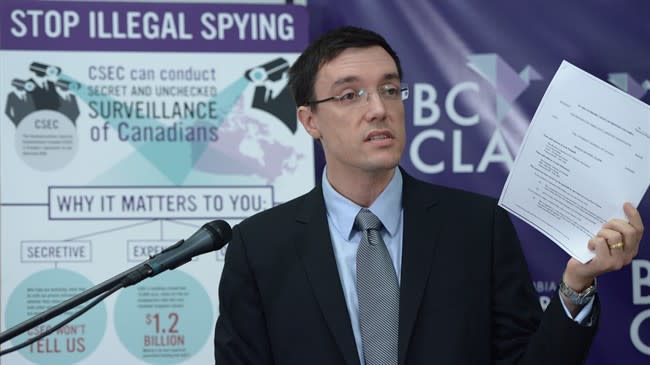Lawsuit claims federal agency is snooping on Canadians' electronic communication

VANCOUVER - The federal government is facing a lawsuit over its electronic surveillance activities, with a Vancouver-based civil rights group alleging Ottawa's secretive eavesdropping agency is prying into the personal communications of Canadians.
The B.C. Civil Liberties Association's lawsuit against the Communications Security Establishment Canada, or CSEC, follows similar cases launched by advocates in the United States and comes as revelations about American spying activities fuel a debate about how far governments should go to keep tabs on both foreigners and their own citizens.
The lawsuit, filed in B.C. Supreme Court on Tuesday, alleges CSEC is infringing on Canadians' rights to free speech and to be protected from illegal search and seizure.
Specifically, the group claims Canadians are being swept up as CSEC monitors emails, phone calls and text messages of foreign targets, when those targets are communicating with Canadians. The lawsuit also says Canadians' data is being collected in a program to monitor and track so-called electronic metadata, which details the time, location and other information about electronic communications.
The group's statement of claim says CSEC is permitted to monitor the content of telecommunications with an authorization from the minister of national defence. The metadata collection, the lawsuit says, occurs under a series of directives from the minister.
None of those activities is the subject of any outside approval or oversight, such as through a court and Parliament, the group says.
"Imagine living in a Canada where your government can listen to your phone call without a court warrant — it sounds unbelievable, yet this is what CSEC is doing," Caily DiPuma, a lawyer with the B.C. Civil Liberties Association, told a news conference in Vancouver.
"This secret and unchecked surveillance of Canadians is unconstitutional. It must be stopped."
CSEC is forbidden from intentionally collecting or analyzing information from Canadian citizens, whether they are in Canada or abroad.
However, the National Defence Act allows the defence minister to give CSEC written ministerial authorization to unintentionally intercept private communications while collecting foreign-signals intelligence.
CSEC's metadata program came under scrutiny earlier this year after details about similar activity in the United States by the National Security Agency were revealed in a leak from former NSA contractor Edward Snowden.
Metadata is information about an email or telephone call, such as the participants, their locations and time of contact.
The B.C. Civil Liberties Association's lawyers said very little is known about CSEC's operations and the rules it follows, and the group hopes the lawsuit will force the federal government to finally tell the public what the agency is up to.
"Canada is not a nation of secret laws," said DiPuma. "We are a society of accountability, transparency, and free and open debate."
No federal government department or agency was willing to discuss the lawsuit or the extent of CSEC's spying activities on Tuesday.
The federal departments of Justice and National Defence each declined to comment, directing calls about the lawsuit to CSEC.
CSEC, in turn, declined to provide anyone to interview or to answer specific questions about the case or the agency's electronic surveillance programs. The agency provided a brief, single-sentence statement: "Under the law, this organization is prohibited from targeting Canadians."
Defence Minister Rob Nicholson's press secretary, Julie Di Mambro, ignored a list of written questions and instead sent the exact same statement as CSEC.
The federal government has been facing increasing pressure to provide details about CSEC's electronic spying programs in the past several months in the wake of the NSA leaks south of the border.
In August, Robert Decary, who at the time was CSEC's independent commissioner, delivered a report to Parliament that suggested ordinary Canadians may have been illegally spied on, but he complained that poor record keeping meant he couldn't be sure.
Michael Geist, a law professor at the University of Ottawa who holds the Canada Research Chair in Internet and E-commerce Law, said there's little doubt that Canadians' personal information and communications have been collected by CSEC. He noted that Canadians' online communications are routinely routed outside the country, even if they are communicating with other Canadians.
"Frankly, it seems hard to imagine Canadians' data is not being swept up," Geist said in an interview.
"The nature of Internet-based communications today is such that it's almost inevitable that you're going to capture Canadians' data. Sometimes, you're going to know it; sometimes you're not. ... In a sense, that's almost an inevitability."
Geist said there is inadequate oversight of CSEC's operations.
"This is all under such a veil of secrecy that it's hard to know exactly what Canada is engaged in," he said.
"The starting point is to bring some sunshine and transparency to the process."
The federal NDP's defence critic, Jack Harris, agreed the public simply doesn't know what information CSEC is collecting. Given that, he said Canadians can't be confident that they aren't being spied on.
"I think most Canadians value their privacy and would want to understand that if there is any incursion into that, then it's done through law and through legal means with proper oversight," said Harris.


